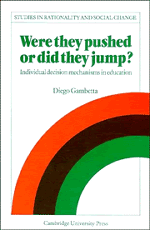Book contents
- Frontmatter
- Contents
- Preface
- List of figures
- Introduction
- 1 THE THEORETICAL QUESTION
- 2 INSTITUTIONAL CONSTRAINTS AND EDUCATIONAL CHOICES
- 3 WERE THEY PUSHED?
- 4 OR DID THEY JUMP?
- Conclusions
- Appendix 1 The high school pupils survey
- Appendix 2 The youth unemployment survey
- Appendix 3 Independent variables
- Appendix 4 Logit models: summary tables
- References
- Index of names
1 - THE THEORETICAL QUESTION
Published online by Cambridge University Press: 07 May 2010
- Frontmatter
- Contents
- Preface
- List of figures
- Introduction
- 1 THE THEORETICAL QUESTION
- 2 INSTITUTIONAL CONSTRAINTS AND EDUCATIONAL CHOICES
- 3 WERE THEY PUSHED?
- 4 OR DID THEY JUMP?
- Conclusions
- Appendix 1 The high school pupils survey
- Appendix 2 The youth unemployment survey
- Appendix 3 Independent variables
- Appendix 4 Logit models: summary tables
- References
- Index of names
Summary
The basic theoretical question – which will provide a regulative idea around which the analysis presented in this book will be organized – can be stated as follows: to what extent can educational behaviour be represented as a product of intentional choice or, conversely, to what extent is it the result of processes which, in one way or another, minimize the scope for a socially meaningful choice at the individual level?
In this chapter I shall outline three major views of the individual agent, which will help in elaborating this question. According to two views, the individual agents are essentially inactive, since they are seen either as constrained by a lack of relevant alternatives or as pushed from behind by causal factors that escape their awareness; whereas in the third view they are regarded as capable of purposive action and of weighing the available alternatives with respect to some future reward. The two former views pertain to the realm of causality, the latter to intentionality. These three approaches have all been applied, often in mutual disregard or opposition, to educational choices as well as to many other choices of social relevance. They raise a great number of problems and are discussed in an equally wide field of literature. In the exposition that follows, therefore, I shall have to be selective and rely partially on the work of others who have already simplified the terms of a complex debate.
- Type
- Chapter
- Information
- Were They Pushed or Did They Jump?Individual Decision Mechanisms in Education, pp. 7 - 29Publisher: Cambridge University PressPrint publication year: 1987



